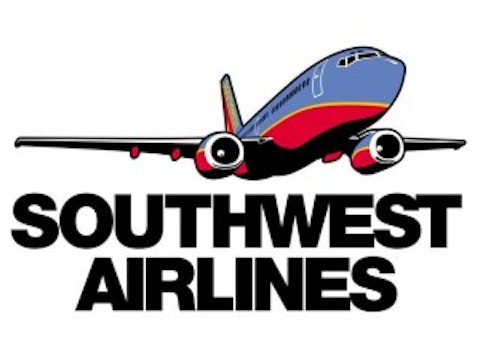Southwest Airlines Co. (NYSE:LUV) has always been admired as the largest low-cost carrier in the United States. Even during times of economic weakness and rising fuel costs, the airline reported profits. In fact, as of June 2012, it has a record of 40 consecutive years of profitable operations. But these aren’t the only points to consider. Investors should look at the following factors which make this company more attractive than its peers.
AirTran integration

This alliance allows customers to fly within connecting routes under the joint networks of Southwest Airlines Co. (NYSE:LUV) and AirTran as well as on a single route. In all, Southwest Airlines is generating an average of $3 million bookings per day from its network connections with AirTran. Bookings driven by such connection capacity will further benefit Southwest‘s revenue in the years to come.
Southwest Airlines Co. (NYSE:LUV) believes that it can now transit Atlanta’s operations to its own model of point-to-point operations, which will bring cost savings through increased employee productivity and better flight scheduling. Point-to-point route structure allows for more direct nonstop routing than the hub-and-spoke model, and thus enables the carrier to control delays and total trip time.
However, the de-hubbing of Atlanta is good news for Delta Air Lines, Inc. (NYSE:DAL). The new schedule spreads flights throughout the day with not more than 20 planes on the ground at a time. No doubt, this will ease jamming at the airport, but Southwest’s elimination of non-stop service from Atlanta to smaller cities such as Rochester, New York, and Flint, Michigan will strengthen the presence of Delta Air Lines, Inc. (NYSE:DAL), as these cities are becoming Delta monopolies.
Latin American operations of AirTran present it with significant near-term growth opportunities that were not available to it in the domestic U.S. market. Additionally, it will help Southwest Airlines Co. (NYSE:LUV) to expand its route network in key markets it already serves, widen service to many smaller domestic cities it has not yet touched, and provide access to international markets of the Caribbean and Mexico. The acquisition will diversify and extend its presence in the following areas:
To and fro low-fare flights in Atlanta, the largest domestic market that Southwest Airlines has not served.
To serve the world’s busiest airport known as Hartsfield-Jackson Atlanta International Airport.
In September 2011, Southwest Airlines announced plans to expand its service plan for the airport with two additional nonstop destinations, which are Las Vegas and Phoenix. By restoring the hub, Southwest Airlines expects to boost sales by $750 million to $1 billion. The acquisition has expanded Southwest’s presence in New York LaGuardia, where it had little presence, and in Ronald Reagan Washington National Airport, where it had no service. It will also further expand the company’s service in key domestic markets, including Boston and Baltimore, and add more destinations to its route system.
Buybacks and dividends
In the first quarter of 2013, Southwest Airlines Co. (NYSE:LUV) repurchased 9 million shares for around $100 million at an average price of around $11 per share, and distributed $15 million in dividends. It also announced an additional $500 million in buyback, taking its total buyback authorization from $1 billion to $1.5 billion. Of this, Southwest Airlines has used $725 million to date and has an authorization worth $775 million left to repurchase its stock.

